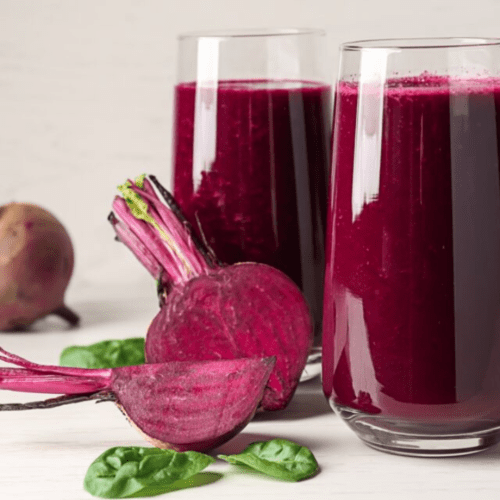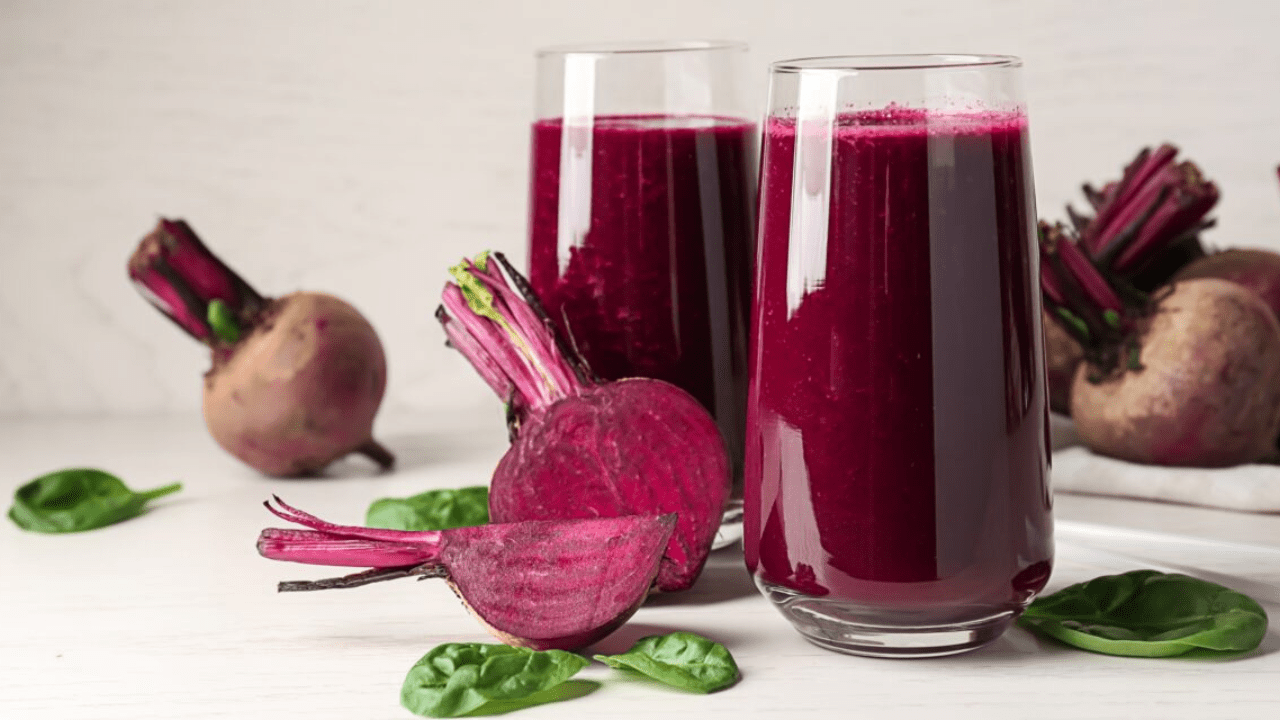Beet juice is an increasingly popular drink known for its vibrant colour, refreshing taste, and extensive health benefits. This nutrient-packed juice is made from beets, a root vegetable rich in vitamins, minerals, and plant compounds with powerful medicinal properties. Whether you’re looking to boost your energy levels, support heart health, or simply add a delicious and nutritious drink to your diet, beet juice can be an excellent addition to your wellness routine.
In this article, we will explore the nutritional profile of beet juice, the health benefits it offers, and how to prepare it at home using simple ingredients. We’ll also provide tips for enhancing the flavour, storage guidelines, and suggestions for customizing the recipe to suit your taste and health goals.
The Nutritional Profile of Beet Juice
Beet juice stands out for its impressive nutritional composition, making it a great choice for anyone looking to improve their overall health. Here’s a breakdown of some of the key nutrients found in beet juice:
1. Vitamins and Minerals
Beets are loaded with essential vitamins and minerals that are important for maintaining good health:
- Vitamin C: A potent antioxidant that boosts immune function and promotes healthy skin.
- Folate (Vitamin B9): Critical for DNA synthesis and repair, folate is also essential during pregnancy for proper fetal development.
- Potassium: Important for heart function, nerve signalling, and muscle contractions.
- Iron: Essential for transporting oxygen throughout the body and preventing anaemia.
2. Antioxidants
Beet juice is rich in betalains, which are pigments responsible for the deep red colour of beets. These compounds have been shown to have anti-inflammatory and antioxidant properties, helping to protect cells from damage and reducing inflammation in the body.
3. Dietary Nitrates
One of the most significant health benefits of beet juice comes from its high concentration of dietary nitrates. When consumed, nitrates are converted into nitric oxide, a compound that helps relax blood vessels and enhance blood flow. This can lead to lower blood pressure and improved oxygen delivery to muscles, which is why beet juice is often used as a pre-workout drink by athletes.
4. Fiber
Although the fibre content of beet juice is reduced compared to eating whole beets, making juice from fresh beets still retains a small amount of fibre, especially if you choose to keep the pulp.
Health Benefits of Beet Juice
Drinking beet juice regularly can provide a range of health benefits. Let’s explore some of the key benefits:
1. Improves Heart Health
Beet juice is well-known for its potential to lower blood pressure. This is primarily due to the dietary nitrates found in beets, which convert to nitric oxide in the body and help to dilate blood vessels. Studies have shown that consuming beet juice can significantly lower both systolic and diastolic blood pressure, making it a natural option for supporting cardiovascular health.
2. Enhances Athletic Performance
Many athletes and fitness enthusiasts have incorporated beet juice into their pre-workout routines. The nitric oxide produced from dietary nitrates enhances oxygen utilization and improves blood flow to muscles, helping athletes exercise more efficiently. Some research suggests that beet juice can improve stamina, delay fatigue, and boost overall performance during endurance activities.
3. Supports Liver Detoxification
Beet juice can play a key role in liver health thanks to the presence of betaines and antioxidants that promote the liver’s detoxification processes. The liver is responsible for filtering toxins from the blood, and beets can help stimulate the liver’s function and promote the elimination of harmful substances. Drinking beet juice regularly may help improve liver function, reduce inflammation, and prevent liver disease.
4. Boosts Immune System
Rich in Vitamin C and antioxidants, beet juice can boost your immune system. Vitamin C boosts the production of white blood cells, which are essential for fighting infections. The antioxidants in beet juice also help protect cells from oxidative stress and damage, further enhancing immune function.
5. Aids in Digestion
The fibre content in beet juice, while lower than that of whole beets, can still support healthy digestion. Beets are a natural source of prebiotics, which help nourish the beneficial bacteria in your gut. Consuming beet juice can help maintain a healthy digestive system and prevent constipation.
6. Promotes Skin Health
Beet juice contains antioxidants and vitamins that can benefit your skin by fighting free radicals and promoting a healthy complexion. Vitamin C in beet juice promotes collagen production, essential for skin elasticity and preventing premature aging. Additionally, the anti-inflammatory properties of beets may help reduce acne and promote clearer skin.
How to Make Beet Juice at Home
Making beet juice at home is incredibly easy and allows you to control the freshness and quality of the ingredients. You can use a juicer for a quick and simple method, or a blender if you don’t have a juicer on hand. Here’s how to make your own beet juice in just a few minutes.
Ingredients:
- 2 medium-sized beets (washed, peeled, and chopped)
- 1 medium-sized apple (optional for added sweetness)
- 1 small lemon (for a citrusy twist)
- 1 small piece of ginger (optional for added flavor and health benefits)
- 1 cup of water (if using a blender)
Instructions:
Step 1: Prepare the Ingredients
- Wash the beets thoroughly and peel them to remove any dirt or blemishes.
- Chop the beets into small pieces for easier processing in your juicer or blender.
- If you’re adding apple, lemon, or ginger, prepare those by washing and chopping them as well.
Step 2: Juice or Blend
- Using a juicer: Process the beets, apple, lemon, and ginger through the juicer one by one. The juicer will separate the juice from the pulp, leaving you with smooth, fresh juice.
- Using a blender: Combine all the ingredients in the blender along with 1 cup of water. Blend until smooth.
Step 3: Strain the Juice (Optional)
- If you use a blender, pour the blended mixture through a fine-mesh strainer or cheesecloth to remove the pulp, leaving you with smooth juice.
Step 4: Serve and Enjoy
- Pour the juice into a glass and serve it immediately for the freshest flavour. For a touch of elegance, you can garnish the juice with a slice of lemon or a sprig of mint. Serve the juice chilled for the best flavour.
Tips for Making the Best Beet Juice
While beet juice is already delicious on its own, here are some additional tips to help you get the most out of your homemade juice:
1. Add a Sweetener
If the earthy flavour of beets is too strong for you, consider adding a sweetener like honey, agave syrup, or maple syrup. You can also balance the flavours by adding sweet fruit, such as apples, carrots, or oranges.
2. Boost Nutritional Content
For an extra nutritional punch, try adding a handful of leafy greens like spinach or kale to the blender. These greens provide additional vitamins and minerals without altering the taste too much.
3. Experiment with Spices
To enhance the flavour of your beet juice, experiment with spices like cinnamon, turmeric, or black pepper. These spices not only add flavour but also offer anti-inflammatory and antioxidant benefits.
4. Drink It Fresh
Beet juice is best consumed immediately after preparation to retain its nutritional value. However, if you need to store it, pour the juice into an airtight container and refrigerate it for up to 2 days. Shake well before serving.
Nutritional Information (Per Serving)
- Calories: 9 kcal
- Carbohydrates: 3g
- Protein: 0.3g
- Fat: 0.1g
- Saturated Fat: 0.01g
- Polyunsaturated Fat: 0.03g
- Monounsaturated Fat: 0.01g
- Sodium: 4mg
- Potassium: 45mg
- Fiber: 1g
- Sugar: 1g
- Vitamin A: 6 IU
- Vitamin C: 14 mg
- Calcium: 9 mg
- Iron: 0.2 mg
Frequently Asked Questions (FAQs)
1. How often can I drink beet juice?
You can safely drink beet juice daily. However, it’s best to start with small servings (about 1/2 cup to 1 cup per day) to see how your body reacts, as beets can affect urine colour and may cause mild digestive discomfort for some people.
2. Can I use canned beets for juice?
While fresh beets are the best option for making juice, you can use canned beets in a pinch. Just make sure they are unsalted and drain the liquid before juicing.
3. **Is beet juice good for
weight loss?**
Beet juice can be a part of a healthy diet for weight loss because it’s low in calories and high in nutrients. The nitrates in beet juice can also improve exercise performance, helping you burn more calories during physical activity.
4. Does beet juice have side effects?
Beet juice is safe for most people, but it can cause your urine or stools to appear reddish (a harmless condition known as beeturia). Additionally, people with kidney stones or high oxalate levels should be cautious, as beets contain oxalates, which may contribute to stone formation.
Conclusion
Beet juice is a nutritional powerhouse that offers a range of health benefits, from lowering blood pressure to boosting athletic performance and supporting detoxification. With its rich content of vitamins, minerals, and antioxidants, it’s a delicious and refreshing way to enhance your overall health. Plus, making beet juice at home is simple and allows you to customize it to your liking. So next time you’re looking for a vibrant, nutrient-dense drink, give beet juice a try—you won’t be disappointed!
For more Beet juice, check out this link

Beet Juice: A Nutritional Powerhouse
Equipment
- 1 Blender or Juicer Essential for preparing the juice.
- 1 Strainer If using a blender, you may need this to strain the juice
- 1 Knife Used for chopping beets and other ingredients.
- 1 Cutting board For preparing the ingredients
Ingredients
- 2 medium sized beets
- 1 medium siyed Apple optional for sweetness
- 1 small lemon
- 1 small piece Ginger optional
- 1 cup water optional, if using a blender
Instructions
- Prepare the Ingredients: Wash the beets thoroughly, peel them, and cut them into small pieces. If you're using apple, ginger, or lemon, be sure to wash and chop them as well.
- Juice or Blend:If you're using a juicer, process the beets, apple, lemon, and ginger one by one. If using a blender, combine all the ingredients with 1 cup of water. Blend until smooth.
- Strain the Juice (optional): If using a blender, pour the juice through a strainer or a cheesecloth to remove the pulp for a smoother consistency.
- Serve: Pour the juice into a glass and, if desired, garnish with a slice of lemon or a sprig of mint. Serve fresh and chilled for the best flavor.
Notes
- Storage: Beet juice is best consumed fresh. If storing, keep the juice in an airtight container in the refrigerator for up to 2 days.
- Tip for a smoother texture: If you prefer a smoother juice, you can strain the blended mixture using a fine mesh strainer or a cheesecloth.
- Optional Add-ins: Feel free to add honey or agave syrup for added sweetness. If you want an extra nutritional boost, you can add a handful of spinach or kale before blending.
- Health Tip: Beet juice is known to help lower blood pressure and improve stamina, making it a great pre-workout drink.

